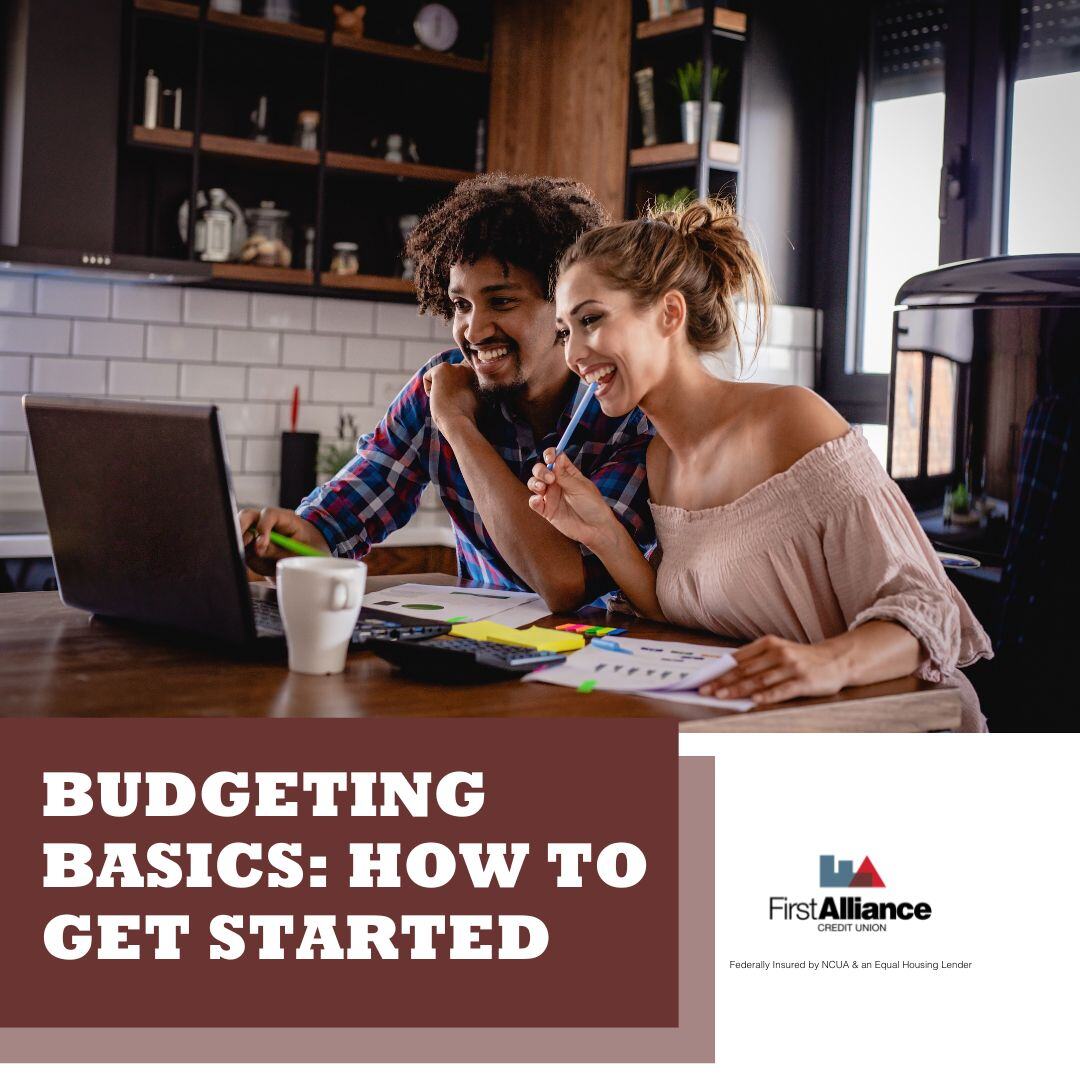Interview with an Expert: Budgeting and Saving Advice
Everyone says they want to save more money and be better at managing their finances. But if you don't know where to start or have questions along the...

Sarah and Jake are in their mid-twenties, excited about their future but feeling overwhelmed when it comes to money. They both work stable jobs and have been banking with First Alliance Credit Union for a while.
Their dream? To be financially responsible. They want to save for emergencies, pay off debt, and eventually buy a home. But right now, they feel stuck—where does their money even go each month?
One day, while talking to a First Alliance Member Expert, they learned about budgeting. It sounded boring at first (who wants to spend their free time crunching numbers?), but once they got started, everything changed.

A budget is a plan for your money. It tells you:
Without a budget, money disappears fast. One second, you get paid, and the next, you’re wondering why you only have five dollars left in your account.
A budget helps you stay in control, avoid financial stress, and make your money work for you.

Sarah and Jake didn’t know where to begin, but their Member Expert broke it down into three simple steps.
A budget starts with knowing exactly how much you earn and where you spend it. Many people underestimate how much small expenses add up.
Income: Paychecks, side gigs, tips, money from selling old items
Fixed Expenses: Rent, car payment, insurance, student loans
Variable Expenses: Groceries, gas, eating out, streaming services
After doing this for a month, Sarah and Jake realized they spent much more on takeout than they thought.
A simple way to get started is by using a Budgeting Calculator, which helps break down your expenses and shows where you might need to adjust.

Not all budgets are the same. First Alliance helped them find the right method for their lifestyle.
This method is simple, flexible, and helps balance financial priorities.
This method is good for people who want complete control over their spending.
This method ensures that savings are a priority rather than an afterthought.
If you’re unsure which method works best for you, a Member Expert can help you compare your options.
Sarah and Jake didn’t want to spend hours on spreadsheets, so they used First Alliance’s tools to make budgeting easy.
Budgeting Calculator – Helps you track income and expenses with a simple breakdown.
Savings & Goal-Setting Tools – Open a club savings account or a certificate of deposit (CD) to build savings for emergencies, vacations, or future investments.
Member Experts– One-on-one guidance to help set realistic goals and fine-tune your budget.
Online & Mobile Banking – Track spending in real-time and set up automatic transfers to savings.
First Alliance’s mission is to provide possibilities, and their vision is to create a financial oasis where everyone has access to the opportunities they deserve. With these tools and support, Sarah and Jake finally felt in control of their finances.

Now that Sarah and Jake had their budget in place, they wanted to plan for larger expenses, like a car and an apartment deposit. Their financial coach helped them break it down into manageable steps.
Set a Goal: Determine how much they needed and by when.
Automate Savings: Set up a separate account specifically for that goal.
Adjust the Budget: Cut unnecessary spending and redirect that money toward savings.
They also built an emergency fund, starting with just $500 and gradually working up to a few months’ worth of expenses. Their budget made this process easy by allocating a small amount each month to savings.
Budgeting isn’t just for people starting out. Many people need to rebuild after a setback, whether it’s job loss, divorce, or an unexpected expense.
For those in this situation, First Alliance recommends:
Assessing Your Current Financial Situation – List all debts, expenses, and income.
Creating a Realistic Budget – Focus on needs first and cut non-essential spending.
Setting Achievable Financial Goals – Start with small, realistic goals and build from there.
Using First Alliance’s Financial Tools – Get guidance from financial coaches and use the budgeting calculator to stay on track.
A setback doesn’t mean starting over from scratch. It means having a new plan to move forward.
Sarah and Jake’s journey with budgeting wasn’t about limiting their lives—it was about creating a plan for their future. With the right tools, they built an emergency fund, planned for big purchases, and even started saving for their long-term goals.
First Alliance Credit Union made the process simple by providing:
A budgeting calculator to track income and expenses
Member Experts to help make sense of their goals
Goal-based savings options to keep them on track
Now, they’re no longer worried about where their money is going—they’re in control. If you’re ready to take the first step toward financial stability, visit First Alliance Credit Union and see how easy budgeting can be.

Everyone says they want to save more money and be better at managing their finances. But if you don't know where to start or have questions along the...

If you've ever felt like your money slips away faster than you can keep track of it, you're not alone. Managing finances on a tight budget can be...

One of the most important and fundamental habits for financial wellness is budgeting. By making budgeting a habit now, you will see lots of benefits...